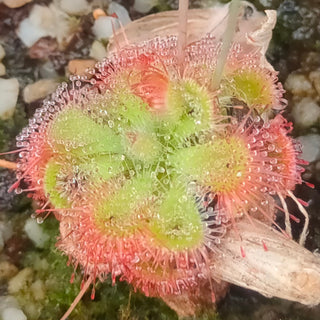Iris versicolor
HARLEQUIN FLAG IRIS, NORTHERN BLUE FLAG
- Unit price
- / per
It is a species of Iris native to North America, in the Eastern United States and Eastern Canada. It is common in sedge meadows, marshes, and along streambanks and shores. The specific epithet versicolor means "variously colored".
Iris versicolor is also commonly known as the blue flag, harlequin blueflag, larger blue flag, northern blue flag, and poison flag, plus other variations of these names, and in Britain and Ireland as purple iris.
Iris versicolor is a flowering perennial plant. It tends to form large clumps from thick, creeping rhizomes. Flowers are usually light to deep blue (purple and violet are not uncommon) and bloom during May to July.
The iris is the official state flower of the U.S. state of Tennessee. This designation was made in 1933 by the state legislature. Although the law does not specifically define a type of iris, it is generally accepted that the purple iris is the state flower.
The blue flag is the provincial flower of Quebec, having replaced the Madonna lily which is not native to the province.
The Purple Iris is the official flower of Kappa Pi International Honorary Art Fraternity.
Type: Hardy perennial
Height: 40", 100cm
Hardiness zones: 3-9
Seeds per packet: 15
Sow just under the surface of the soil and water in. Leave them at room temperature for 6 weeks. This helps break the phytohormones which inhibit germination. They will not grow yet. Then a cooling period is required. Cover them with plastic and place in a fridge for 80 days. Be sure they stay moist. After the cold stratification period they are then brought back to a cool room (15-18C, 59-68F) for them to germinate. Germination can be erratic, generally 30-90 days after the warming period for most seeds, though some can take longer.
Ornamental use only. These seeds and or plants are poisonous.
Iris versicolor
HARLEQUIN FLAG IRIS, NORTHERN BLUE FLAG
- Unit price
- / per
Multiple secure payment options available.
Adding product to your cart
You may also like
It is a species of Iris native to North America, in the Eastern United States and Eastern Canada. It is common in sedge meadows, marshes, and along streambanks and shores. The specific epithet versicolor means "variously colored".
Iris versicolor is also commonly known as the blue flag, harlequin blueflag, larger blue flag, northern blue flag, and poison flag, plus other variations of these names, and in Britain and Ireland as purple iris.
Iris versicolor is a flowering perennial plant. It tends to form large clumps from thick, creeping rhizomes. Flowers are usually light to deep blue (purple and violet are not uncommon) and bloom during May to July.
The iris is the official state flower of the U.S. state of Tennessee. This designation was made in 1933 by the state legislature. Although the law does not specifically define a type of iris, it is generally accepted that the purple iris is the state flower.
The blue flag is the provincial flower of Quebec, having replaced the Madonna lily which is not native to the province.
The Purple Iris is the official flower of Kappa Pi International Honorary Art Fraternity.
Type: Hardy perennial
Height: 40", 100cm
Hardiness zones: 3-9
Seeds per packet: 15
Sow just under the surface of the soil and water in. Leave them at room temperature for 6 weeks. This helps break the phytohormones which inhibit germination. They will not grow yet. Then a cooling period is required. Cover them with plastic and place in a fridge for 80 days. Be sure they stay moist. After the cold stratification period they are then brought back to a cool room (15-18C, 59-68F) for them to germinate. Germination can be erratic, generally 30-90 days after the warming period for most seeds, though some can take longer.
Ornamental use only. These seeds and or plants are poisonous.
You may also like
You may also like
Recommended Products
CUSTOMERS ARE ALSO BUYING THESE
Recently viewed products
Testimonials
Here's What Some Of Our Customers Had To Say (Thank you!)
I just wanted to take a moment and let you know how incredibly awesome you guys are. Searching for quality and variety is time consuming. We are always looking for new and unique plants and cut flowers and we always find great treasures with you. Your selection is incredible! We also very much appreciate the ease and speed of our orders. Its nice to know that one of the most important parts of what we do starts with where we get our seeds from and that the quality is good. It saves us a lot of time and money and helps us be completely confident on selection and viability of the seeds so thank you for being an important part of making our vision come to life.
I buy a ton of seeds for food and flower. I LOVE THIS PLACE !!!!! Wow the variety of indoor speciality plants for indoors because of our weather. I used to have thousands of plants and through the years there was downsizing etc and now I am trying to revive my plant menagerie and this place send great packaging and viable seed so I am so happy. Look online, they have a ton of beautiful & unique plants.
More than 10 stars from me.

I'm on my third order. I'm really happy. My first seedlings have already come out and some have even been transplanted into larger pots. There are even plants that I had difficulty finding, and I found them on your site. A big thank you to you! And surely a future order in 2026

First time ordering last year! WoW1
I started ordering seeds from this company a year ago... all the seeds germinated which i cant say about other seed companies' They also have a great selection of usual seeds and old time seeds which i love.

I got these pretty quickly and in perfect order. I can't wait to see what they look like once I plant them. I have another colour and they were so pretty I had to try these. I have used this seller a few times now with great success, and will again. Everything I have ordered has been of good quality!

The seeds were delivered very quickly. The seeds germinated within a week and small lotuses are already growing in the aquarium. Thank you!

I was apparently one of their first international customers. The seeds were well packed and labeled. The seeds also arrived quite fast to my country. Terry, was a very great help.
I waited this long to post since I had only recently planted my seeds and they successfully germinated.
Also wanted to add that this seller is one of the only ones selling legitimate cymbopogon nardus(the actual citronella plant) seeds.

All seeds germinated! Great shop and really fast shipping.

These arrived quickly. I sowed in some peat moss and placed them a humid environment. In 2 weeks the first one sprouted.

I am very pleased with the seed I have recieved and have increased my order this year. The selection is vast and I have been able to find many on my special wish list. The service is fast and friendly. Queries are answered quickly. I highly recommend this source for seed.

Great product ! All seeds germinated and flourished nicely.

Very healthy Clivia seeds arrived quickly and packaged with care. All 5 seeds were sprouting roots when received and are already showing leaf growth!! Definitely recommend. Thank you Ferri Seeds.

I spent about a month designing my border and cottage gardens while it was raining and snowing. I made a list of the flowers and now I started to shop for my seeds. I went to all the usual seed retailers and could not get much of what I wanted. I thought I was going to have to shop online in the USA which is against my principles in this environment we find ourselves. THEN I FOUND YOU! Thank you for being there for me on two fronts: I fully completed my list and I shopped Canadian. It's been a really good day. Thank you

I had a herbarium project with a short deadline. Ferri Seeds were professional, friendly and sent me Alstroemeria seeds promptly. The seeds arrived in a protective sleeve within a letter envelope. The herbarium is complete! I highly recommend Ferri Seeds! Thank you!

I have a “wild “ garden , and love to bring in grasses and flowers with the unique shapes and subtle colours I see in nature. My plant references are often gardens in the UK and Europe where there is a tremendous diversity of plants available, that were previously not accessible in Canada. Thank- you so much, Ferri Seeds , for opening up my garden world .

Seeds arrived well packaged. Every single seed germinated and developed into a nice little seedling. The plants are developing very well.

I was looking for a local, reputable company to buy seeds from and was very pleasantly surprised at their selection and pricing. I found more on this site than I could on bigger name brands. I'm very pleased to be able to have gotten exactly what I wanted and not have to compromise with a bigger company. Will definitely be purchasing again, especially love the more rare varieties offered.

The pictures and reviews caught my attention and thus my order. I also am determined to buy Canadian and after seeing that you ship from Toronto sealed the deal. Buy locally, provincially or nationally will be my modus operandi for the foreseeable future

Planted the Drosera sessilifolia seeds in March. Took a couple of months but they sprouted in May. Out of the 10 seeds, about 8 or 9 came up. Tiny but cute! Thanks!

Fast shipping, good packaging, instructions included. They have germinated!
I have just placed my first order with Ferri Seeds. Prior to placing my order, I had several questions concerning the seeds I was considering, and Terry was wonderful at responding to them. Terry’s responses were thorough, friendly and super-fast. My first customer service experience with Ferri Seeds has been amazing.

Received as described. Germinated well.

I ordered several seeds packets from Ferri Seeds and they all arrived in a safe little box, with each type in a plastic baggie or glossy paper pouch. The seeds were good quality and some have already germinated! I had a question as a follow up and they responded over the weekend! Would buy from them again in the future.

Seeds germinated after about 5-6 weeks of cold stratification in the fridge... they are indeed viable.

Received my African Violet seeds very fast. Planted them as described and its been about 3 weeks and I now have 9 out of 12 seeds that have sprouted! Still early and another keeps popping up everyday so wouldn't be surprised if they all germinated. So excited to see what I get. Thank you so much!

I ordered Herniaria seeds from you and they arrived quite quickly. I started them on June 27 and they are germinating now (5 days)! I am so pleased. I had ordered the same from a company in Asia and absolutely nothing happened. I am so happy to have found your company - and it is CANADIAN. I will be putting in another order - as soon as I have looked at your complete catalogue. It is very extensive and the photos are wonderful. For the past three years I have been growing coleus from cuttings and from seed and you have varieties that are not readily available. Thank you.

Ferri Seeds is truly a wonderful company. They take the utmost care when delivering your seeds. Mine arrived promptly and when I had any questions, they were so happy to help me. I am looking forward to getting more from them soon. Thank you David for making this a delightful experience.

They are coming up in the soil so I am happy!

The customer service is 100%. I am so happy I chose this company. The seller is so sweet and kind. I contacted her a few times as I had questions, and she answered it every time. I would definitely order from her again. You don't get customer service like that these days! I am extremely happy with my purchase ☺️ The item matched the description.

Arrived within days! So happy to receive these seeds and can't wait to see them bloom in my garden next Spring. Thank you so much for offering these seeds up as this plants was not to be found in the nurseries around me. Cheers!

I ordered banana tree (Ensete glaucum) seeds from Ferri Seeds and received them quickly. They started germinating within a few weeks.

All 3 seeds sprouted and now they are outside already. As you can see on the picture I didn’t give it too much fate so I just planted them in a bunch and now all tree of them are growing fast. Now I wish I planted them separately!
Super high quality seeds, it really makes a difference for germination success! I bought 25 seeds of Mexican fleabane and about 10 of them germinated in the first week after sowing. I was really excited to grow this daisy but was worried I might not have success with germination as it can take a long time with this plant. I was amazed to see seedlings after just one week! Thank you so so much, couldn’t be happier! ♥️

My order, made late afternoon, April 27th, and needed in a bit of a rush, was mailed next morning and arrived in my rural mailbox in BC, May 5th.
Thank you for your cheerful, friendly emails and prompt service. I certainly recommend you others and will be sure to keep an eye on the range of seeds you offer in future.

I happened across Ferri Seeds website when I Googled a particular plant I’d been looking for. I was impressed by their selection of all types of seeds and their good product descriptions along with detailed germination instructions. I found the site and ordered on a Saturday. On Sunday I got a notice that my order had been shipped! The seeds were in my P.O. box on Friday. Such amazing service. It’s too early to comment on germination rates — I’ve just started the stratification process today.

I love your seeds they are all coming up great for me. Will sure pass your name onto my friends.

I ordered seeds and noticed after submitting that my postal code was incorrect, my fault. I contacted Ferri and was responded to right away even though they had no power. They thanked me for my understanding, as they had indicated there may be a delay. I got the seeds within 5 business days, very well packaged with detailed instructions on the back. So happy, can't wait to see results. Also happy it is Canadian!

I just recently checked out the Ferri Seeds website for the first time. I got so excited about all the different and interesting seeds that are available. I made a purchase right away but forgot to add the discount code I received because it was my first purchase. When I contacted Ferri Seeds, Alex was very helpful and immediately and kindly applied the discount for me! Thank you so much for your quick response and excellent service.
Incredible quality seeds - I sowed these just 2 days ago (about 50 of them) and I already have about 15 seedlings! Really excited to grow the very beautiful blue swan river daisy, so happy the seed germination has been a breeze! I was expecting to wait much longer to see anything pop up. So delighted! Beyond my expectations, thank you so so much! ♥️

Fast shipping, good packaging, instructions included. They have germinated!

Very satisfied, quick service

Ferri Seeds – one of the best online and most helpful businesses I have ever had dealings with. Quick turnaround, dispatch, and beautifully packaged seeds. What more could you want – beautiful flowers would be nice. Well I am sure they will turn out to be.

1. It's Canadian!!
2.Interesting variety of seeds that are sometimes hard to acquire.
3.Prompt acknowledgement of orders and speedy delivery...

I had made an error with the adress and upon getting the order back from the post they contacted me and even agreed to send it to a new address without extra charges.
Honestly this kind of service is rare these days.
Thank you to the team of Ferri Seeds, rest assured I will be purchasing from this vendor again.

The seeds were received fairly quickly, considering they came from Canada. Cost of the seeds versus the quantity is fantastic.

Delights to deal with! I had questions regarding the germination instructions of my first package of their seeds. Their customer service was exceptional! Clear instructions, lovely people! I've since ordered several sets of seeds!

Ferri Seeds offered a hard to find seed on their website. I placed the order but had questions about product and delivery. Customer service contacted me right away. My questions were answered right away. I was kept updated on delivery progress. The seeds were exactly what I wanted. My husband is a very serious gardener. I will do more business with Ferri.

The Japanese anemone seeds arrived promptly. Thank you Ferri Seeds!!

Very healthy Clivia seeds arrived quickly and packaged with care. All 5 seeds were sprouting roots when received and are already showing leaf growth!! Definitely recommend. Thank you Ferri Seeds.
We carry a diverse selection of seeds from around the world, many are rare and hard to find!
Regular new seed stock, special cold/dry storage facility, and record keeping ensures our stock is fresh and ready to grow for you.
We welcome your contact. We reply the same day or next business day with a friendly and personalized answer to your inquiry!
When you sign up, you are agreeing to receive promotional emails and other marketing communications from us. In the future, you can always unsubscribe.


















